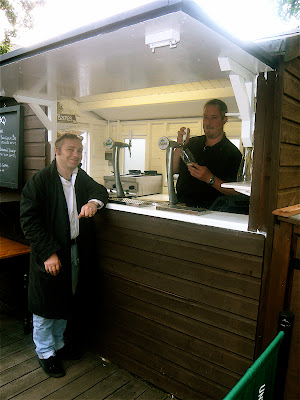During one of the few tea breaks in the studio (we like to work) we embarked on a topic that is very close to my heart.
Technique over Art. The general opinion was that many of the established fine designer bookbinders, in the Uk at least, was that some are perhaps not able understand the art of the book.
By this I mean that though good technique is important, the function of the book (within the realm of fine, designed bindings) is not compromised. That the manipulation of the materials, surface decoration and over all impression of the book works as a whole.
Where this can fall down is when the technique becomes the important thing. I am sure that we have all looked at a fine binding, perhaps by a 'Master' that is a self masturbatory exercise in technique. The sort of work that the viewers look at the work and say something like ' oh he/she is so good at...........' what the viewer is saying is key. That the technique has overtaken and suppresses the art. The 'master' on hearing this sticks out their chest, and with a smug look thinks themselves to be the best. It is easy to see how they can start to believe their own press, to produce work that is a series of banal exercises. In the end creating wall paper. As this 'master' begins to get a gather a sycophantic and vocal clique, more and more people are beguiled into believing the press and aping the 'master' thus propagating the myth.
One of the potential problems is that when this 'master is then paraded as being the best, it can stifle true creativity within the genre. For the binder who acknowledges the technical skill and strives to perfect their own but also balances this with the art of the book, life can be difficult. It would seam that this binder is going against the norm, being a bad boy/girl of the bookbinding world.
The banal has become the expected norm, anything that bucks that norm is castigated, derided as being non bookbinding, as not respecting the craft of the genre - not being true to the tradition. The banal 'master' is safe in the knowledge that his or her status is safe, that their individual approach to the art and craft of the book is the only one of any merit.
This is surely bad for any binder who wants to move forward, to be able to express what they are able to draw from the text, to be able to share with others the art of the book. The banal sycophant is unable to understand the work as it is not what they have been told is correct, therefore, in their eyes, it is not correct. There is also the case of the of the sycophant rejecting the work as worthless, as their work apes the 'master' and must be the correct form.
The general opinion in the studio was that there has to be a healthy balance between the trad and the contemporary, that the 'master' should recognise and applaud the new work as should the young bloods recognise the contribution that the 'master' has made in the past. The sycophants should get their faces out of the 'masters' arse and get a life.
Thus the rest period ended and work resumed.












